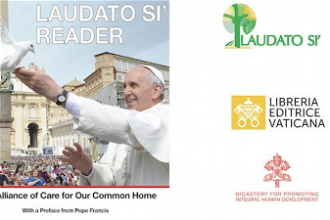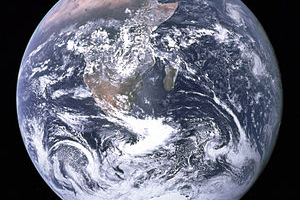Laudato Si' and Multinational Corporations

Fr Seán McDonagh, SSC,
The following is a talk given by Fr Seán McDonagh, SSC, on 22 September at a Rome Seminar, 'Laudato Si': Then Greening of the Church'.
Criticism of the extraordinary economic and political power of multinational corporations runs right through Laudato Si'. Towards the end of No.34, Pope Francis tells us that the impact of commercial business if often making the world less rich and less beautiful. Further on, in No.37 he decries "proposals to internationalize the Amazon which only serves the economic interest of transnational corporations." Pope Francis is particularly critical of the way transnational mining corporations operate in poor countries. "There is also the damage caused by the export of solid waste and toxic liquids to developing countries in ways they could never do at home in the country in which they raise their capital. We note that often the businesses which operate this way are multinationals" (No. 51). He returns to this theme in No. 173 where he gives the example of "powerful companies dump(ing) contaminated waste or offshore, polluting industries in other countries."
The Pope points out that the economics of climate change are "often dominated by more powerful interests "(No. 50). Reflecting on why international summits on climate change and other environmental concerns are often weak, the pope believes that it is because "there are too many special interests and economic interests ...trumping the common good and manipulating information so that their own plans will not be affected" (No.54). In her book on climate change, Naomi Klein speaks of a "tiny elite minority that has a stranglehold over our economy, our political process, and most of our major media outlets." Klein believes that global economic and political decisions during the past three decades "provided maximum freedom for multinational corporations to produce their goods as cheaply as possible and sell them with as few regulations as possible - while paying as little tax as possible." She is clear that "unfettered corporate power posed a grave threat to the habitability of the planet."
The Pope also criticizes the "expansion of oligopolies for the production of cereals and other products needed for their cultivation. This dependency would be aggravated were the production of infertile seeds to be considered; the effects would be to force farmers to purchase them from larger producers" (No. 134).
He is also critical of the political impact of large transnational corporations. "The twenty-first century, while maintaining systems of governance inherited from the past, is witnessing a weakening of the power of nation states, chiefly because the economic and financial sector, being transnational, tend to prevail over the political" (No. 175). Sometimes, as we will see, these economic entities "exercise more power than states themselves" (No. 196).
Pope Benedict and Multinational Corporation
Many of these same criticisms of transnational corporations were made by Pope Benedict in his encyclical Caritas in Veritate. In No. 40, Pope Benedict stated that, "Without doubt, one of the greatest risks for business is that they are almost exclusively answerable to their investors, thereby limiting their social value. Owing to their growth in scale and the need for more and more capital, it is becoming increasingly rare for business enterprises to be in the hands of a stable director who feels responsible in the long term, not just the short term, for the life and the results of his company, and it is becoming increasingly rare for business to depend on a single territory."
Role and Power of Multinational Corporations
In an earlier section (CV No 22), Pope Benedict wrote that "among those who sometimes fail to respect the human rights of workers are large multinational companies as well as local producers". In CV No. 25 he called attention to the, "new forms of competition between states as they seek to attract foreign businesses to set up production centers, by means of a variety of instruments, including favorable fiscal regimes and deregulation of the labor markets. These processes have led to a downsizing of social security systems as the price to be paid for seeking competitive advantage in the global market, with consequent grave danger for the rights of workers, for fundamental human rights and for solidarity associated with traditional forms of the social State."
I thought that both Pope Benedict XVI or Pope Francis might have followed up on these comments with an incisive critique of the unprecedented and distorting power of transnational corporations in the global economic and political spheres. Unfortunately, they didn't. Pope Francis analysis is primarily focused on the role of the market, the state, civil society and the ethical and religious values that ought to underpin the economic enterprise. But the growth in power of multinational corporations over the past century, and particularly since the publication of Populorum Progressio, is probably the most important feature of current economic life. Joshua Karliner in his book, The Corporate Planet: Ecology and Politics in the Age of Globalization, tells us that in 1970 there were around 7,000 multinationals in the world.
By 1995 that number had grown to 40,000. Pope Francis recognizes that "some economic sectors exercise more power than states themselves (No. 196). He continues his critique by bemoaning the fact that "economics without politics cannot be justified, since it impossible to favor other ways of handling the various aspects of the present crisis" (No. 196).
These corporations are huge economic entities. At the end of World War II, over ninety out of one hundred of the richest economic entities on the planet were countries, not corporations. However, by 1995, over fifty-one of the largest economies in the world were corporations. The combined sales of the top Japanese corporations, Mitsubishi, Mitsui, ITOCHU, Sumitomo, Marubeni and Isssho Iwai were almost equivalent to the combined Gross Domestic Product (GDP) of all of South America. In the mid-1990s, the combined revenues of the richest 500 corporations in the United States equaled about 60% of the US GDP.
Multinational corporations dominate whole sectors of the global economy. In the fossil fuel industry transnational companies are both powerful and very profitable. The top five oil companies generated $900 billion in profits during the period from 2001-2010. ExxonMobile holds the record for the highest corporate profits in the United States. In 2011 they earned $41 billion.
We get a real sense of the power of these corporations when we realize that they own 90% of the patents on new technologies and products. They also control 70% of world trade and of that 30% is between units of the same corporation. In terms of products or services, their reach into the global economy is extensive. They are responsible for most of the world's mining operations. They extract, refine and distribute most of the oil, petrol, diesel or jet fuel used around the world. Transnational corporations are also involved in coal mining, and in running hydroelectric and nuclear power plants. They have control of the banks and financial institutions and also of the print and electronic media. The news that most people hear, see or read is mediated through the lenses of corporations.
Historical Point of View
A brief history of the emergence and contemporary power of transnational corporations might help the reader understand why I think the encyclicals should have examined their role in the globalized economy. While transnational corporations are a relatively recent phenomenon, they have their roots in both Church and State. Their ecclesiastical origins go back to Medieval Europe. In the secular world of feudal Europe males passed on their property to their children or other relatives. However, because the leadership of the Church, especially in the monastic communities, was composed of celibate men and women their property was held collectively by the institutions. This gave rise to the idea that an institution could own property and be considered a 'moral' person.
In the secular world, the history of corporations is located in the state-sponsored corporations set up by European colonial powers from the sixteenth century onwards. One of the most prominent was the East India Company which was established under royal charter by Queen Elizabeth I of England, to trade in spices and other exotic goods from the Orient. Its initial capital was £70,000. From its foundations until its dissolution in 1858, it grew into a powerful trading, political and military entity. During the eighteenth and nineteenth centuries the Company promoted British interests throughout Asia. In the nineteenth century, the directors of the Company made massive profits from illegally importing opium from India into China. Corrupt Chinese officials were bribed to turn a blind eye to the trade which resulted in millions of Chinese becoming drug addicts. The British authorities promoted the trade as it paid for Britain's imports from China, porcelain, silk, and, especially, tea.
The Company supplied the raw material for the industrial revolution which was gathering pace in Britain. India also became the dumping ground for cheap clothes and industrial goods that were being mass-produced in England. Local industries were wiped out as prohibitive duties were levied on indigenous goods, leading to poverty and hardship for millions of Indians. The cruel management policies of the Company caused a mutiny of indigenous soldiers in 1857. This led to a parliamentary enquiry into the activities of the company. As a result, the company was dissolved and the assets were taken over by the British government.
The growth in transnational corporations took place in the US after the Civil War. The resources of the world - oil, coal, gas, minerals, timber and food plants - were there to be exploited and transported to any part of the world where they could be used to make a profit. After the 1880s, with the advent of the new petrochemical, electrical, transport, communication and chemical technologies, corporations used scientific research to develop a variety of products for industry and households. Some of the industries which were founded at that time - Standard Oil Company of Ohio (1870), General Electric (1882), Dow Chemical (1897), Johnson & Johnson (1887), Carnegie Steel (1873) and Ford Motors (1903) - are still household names.
One of the crucial factors, guaranteeing the success of corporations, was a corporate-friendly legal framework which had been put in place in the United States by the middle of the nineteenth century. Morton Horowitz, chair of the History of Law at Harvard University, won the Bancroft Prize for his book, The Transformation of American Law: 1780-1860. He wrote that "by the middle of the nineteenth century the legal system had been reshaped to the advantage of the men of commerce and industry at the expense of farmers, workers, consumers and other less powerful groups within society." This allowed the emerging corporations to mobilize capital on an unprecedented scale, opening wide the floodgates for horizontal and vertical integration of corporate structures, paving the way for their control of almost every aspect of the US economy. Their tentacles also reach into the heart of the political system where they spend billions of dollars lobbying politicians to promote their interests, often at the expense of other groups in society. The national importance of corporations in the U.S. economic and political arena was summed up by the 1950s slogan: "What is good for General Motors is good for America."
Colonizing the Political Process
One crucial element in this legal landscape which helped multinationals in a very significant way was the notion of 'limited liability.' This meant that a shareholder in a business could not be held liable for an amount greater than his or her investment in the company. The purpose of this legislation was to encourage entrepreneurs to take risks. Many commentators at the time were opposed to the notion of limited liability. These people argued that limited liability would encourage business people to take excessive risks, leading to what is known as 'moral hazard.' This means that someone would be unlikely to take a commercial risk if they had to carry all the financial consequences of their action. Adam Smith held such a view. According to the economist Ha-Joon Chang, "limited liability provides one of the most powerful mechanisms to 'socialize risk' which has made possible investment on an unprecedented scale."
1886 was another important year in the evolution of the modern corporation. In that year the U.S. Supreme Court heard the case of Santa Clara County vs The Pacific Railroad Company. Contrary to what is often claimed, the court did not rule that corporations were juristic persons and thus protected by the Fourteenth Amendment to the Constitution. However, before oral argument took place, the Chief Justice, Morrison R. Waite stated that the court did not wish to hear argument on the question whether the provision in the Fourteenth Amendment to the Constitutions forbids a State to deny to any person within its jurisdiction the equal protection of the laws, applies to these corporations. "We are all of the opinion that it does."
Many have argued that rights assume corresponding responsibilities and obligations with regard to the well-being of people, human communities and the natural world. However, this was not the case. They didn't. Working conditions were appalling in mines, construction sites and factory floors. In the first half of the twentieth century, multinational companies were seldom held responsible for polluting the air, the water and the soils of the world. In fact, many of the corporations believed that the State had no role in monitoring their behavior as long as they did not break the criminal law. The role of the State was merely to guarantee their freedom to do business and make profits, with as little hindrance as possible.
There is extensive evidence that corporations have colonized the political process in the United States, through large donations to politicians and expensive lobbying. In the 2000 presidential election, the tobacco giant, Philip Morris, donated $2.8 million dollars to the campaign of George W Bush. On taking office the federal government abandoned lawsuits against tobacco companies which could have cost tobacco companies over $100 billion in compensation claims.
The biotech companies were well represented in President George W Bush's cabinet. The Secretaries of Defense, Health, and Agriculture had close connections with the biotech-company, Monsanto. The influence that corporations wield is not confined to the Republican Party. In his presidential campaign Barack Obama attacked the power of the business lobby in Washington and said that he would root this out if elected. His supporters felt let down and very angry when he appointed Michael R. Taylor to the Food and Drug Administration. Taylor had been Vice-President for Public Policy at Monsanto corporation from 1998 to 2001. He was Deputy Commissioner for Policy for the Food and Drug Administration from 1991 to 1994 when that Agency approved the use of Monsanto's GM growth hormone for dairy cows. After a federal investigation he was exonerated. Critics, feared that he might use his position to push poor African countries into accepting GM crops.
This is why Pope Francis had some harsh words about political activity in Laudato Si'. He states that," politics must not be subject to the economy, nor should the economy be subject to the dictates of an efficiency-driven paradigm of technology" (No.189). Pope Francis feels that we need a new politics which is "far-sighted and capable of a new, integral and interdisciplinary approach to handling the different aspects of the crisis" (No. 197). In the same paragraph he denounces "corruption and the failure to enact sound public policies."
Pope Francis is scathing about those whose only goal is the "maximization of profits" (No.195) and he feels that some "reasonable limits" needs to be set to economic growth in some economies (No. 193). The Pope also encourages non-government organizations to "put pressure on governments to develop more rigorous regulations, procedures and controls" (No. 179). This is essential because Pope Francis believes that "in the absence of pressure from the public and from civic institutions, political authorities will always be reluctant to intervene, all the more when urgent needs must be met" (No.181).
United Nations
There are very few global institutions which can monitor and police multinational corporations' behaviour, whether it be in terms of working conditions or environmentally destructive practices. As governments succumbed to corporate pressure, the economist Noreena Hertz claimed that the ordinary citizens whether in the North or South have not been protected from the ravages of neo-liberal economics. She believes that political institutions in many Western democracies have been hijacked by the corporations and, for the most part, do their bidding. In reviewing her book for The Tablet, Terry O'Sullivan wrote "meanwhile those citizens, or at least those that could afford to, have in every sense bought into this new arrangement, happily exchanging their democratic birthright for a mess of consumerism." The public trust in the financial system has collapsed since the beginning of the current financial crisis in 2007, but this skepticism has not overflowed into the publics' perception of the dominant role which multinational companies play on the national and international stage.
Efforts to make multinational corporations more ecologically, economically and socially accountable have been under way since the 1960s. Such a programme was on the agenda of the UN Conference on Trade and Development (UNCTAD) in Santiago in 1972. That led to the UN Economic and Social Council (ECOSOC) setting up a UN Commission on Transnational Corporations as both a research and administrative body. This body set out to draw up codes of conduct for multinational corporations. That ground to a halt with the election of Ronald Reagan as President in 1980. Reagan saw no reason to regulate multinational corporations. His policy was continued by his successor President George Bush. In 1991, his administration wrote to all the U.S. embassies requesting that they lobby governments to oppose any restrictions being imposed on multinational corporations by the UN Code of Conduct. This lobbying was so successful that further attempts to impose codes of conduct on other corporations were effectively halted. A few had already been agreed upon such as the 1981 International Code of Marketing on Breast-Milk Substitutes. This came about because of pressure from the World Health Organization (WHO), the United Nations Children's Fund (UNICEF) and numerous non-government organizations, some of them Church-related.
It is ironic that the demise of the UN Commission on Transnational Companies coincided with the UN Conference on Environment and Development (UNCED), popularly known as the Earth Summit, which took place in Rio de Janeiro in June 1992. The pay-off for getting the corporate world to financially support the Summit was to emasculate the U.N Agency which had attempted to regulate multinational corporations. The UN Agency was killed off in stages. Firstly, there was a reduction in staffing levels. Secondly, the agency was transferred from New York to Geneva, and finally, it was disbanded.
There are not too many options in the international arena to curb the power of multinational corporations. One avenue which ought to be pursued more vigorously is through anti-trust legislation. This was introduced in the late 19th century to stop any single corporation getting a virtual monopoly on goods or services. For example, Microsoft controls much of the software that runs on desktop computers globally. During the anti-trust case taken by the US Department of Justice against Microsoft, the government produced accusations that Microsoft bullied potential competitors out of the market.
At the end of the trial in June 2000, Judge Thomas Jackson found Microsoft guilty of "misusing its monopoly power" and determined that it should be broken up. It was fortuitous for Microsoft that the appeal was heard during President George W. Bush's first term. The US Court of Appeal, while it upheld a number of Judge Jackson's conclusions, criticized the judge and did not direct that Microsoft be broken up.
In No. 67 of Caritas in Veritate, Pope Benedict calls for reform and an enhanced role for the United Nations at a global level. Pope Francis concurs with this in No. 175 of Laudato Si', when he writes that there is a need for "a true world political authority" (No. 175). One of the reasons that the United Nations does not function successfully, is because it is dependent on national governments for its finance.
Tobin Tax
One way of funding the United Nations would be through the imposition of what has been called the Tobin Tax. The idea was the brain child of the American economist, James Tobin. He made the suggestion after the then U.S. President, Richard Nixon announced that he was taking the U.S dollar off the gold standard in August 1971. Since the Bretton Woods Agreement in 1944, the stability of the global financial system was rooted in the fact that one ounce of gold cost $35.
Nixon realized that this conversion rate was no longer feasible since the U.S. had expanded its money supply during the 1960s to fight the Vietnam War. James Tobin fearing that the financial markets would revert to the volatile conditions which prevailed before World War II suggested a new system to promote international currency stability. Tobin was well aware that currency speculators often moved their money in and out of currency at short notice. Moving money quickly can lead to speculation against currencies and provides no long-term benefits for any country, especially poor ones. Speculation forces countries to hike up their interest rates in order to entice the speculator to leave the money in the currency for a longer period of time. Currency speculation had disastrous consequences for Mexico, South East Asia and Russia at various points in the 1990s.
In order to put a brake on this kind of gambling, Tobin suggested that there ought to be a small tax on each currency transaction in order to discourage short-term speculation in currencies. His original proposal was for a tax of 1% of the transaction. Later, he reduced that to a figure of between 0.1% and 0.25%. Tobin's proposal was anathema to currency speculators and, it must be added, to many economists during the neo-liberal ascendancy from the mid-1970s, until 2008. The Tobin Tax has never been implemented.
Though Tobin's suggested tax was only meant to dampen speculation, others felt that this money could be used for a variety of purposes, one of which would be to fund the activities of the United Nations. François Mitterrand, the French president in the 1990s saw the revenue generating potential of a Tobin-like tax. In recent years development agencies have pointed out that a tax levied at a mere .005% on the $912 trillion which is traded on the world's foreign exchanges each year would raise between $30 and $60 billion dollars. This would be sufficient for the G7 to meet the development goals which they agreed at the Gleneagles meeting in July 2005. Some of the money could fund the UN and make it more independent. Currently, the UN has to go cap-in-hand to its major donors to get the funds needed for its various activities. During the administration of Ronald Reagan, George Bush and George W. Bush, the US government often threatened to reduce its contribution to the United Nations, unless the United Nation fell in line with U. S. foreign policy. To function properly as a global organization the United Nations needs a source of income which is not filtered through the hands of politicians from any country or group of countries.


















